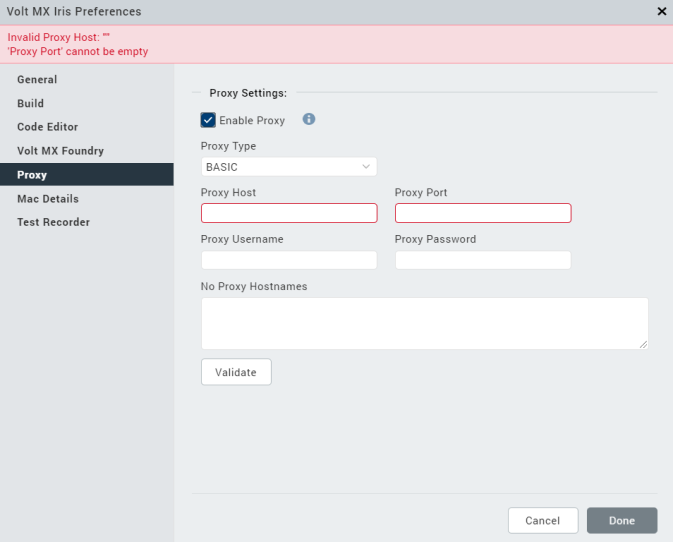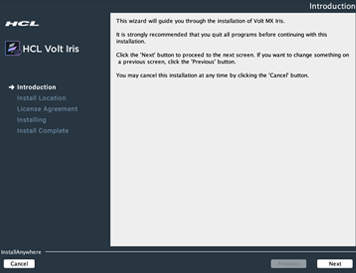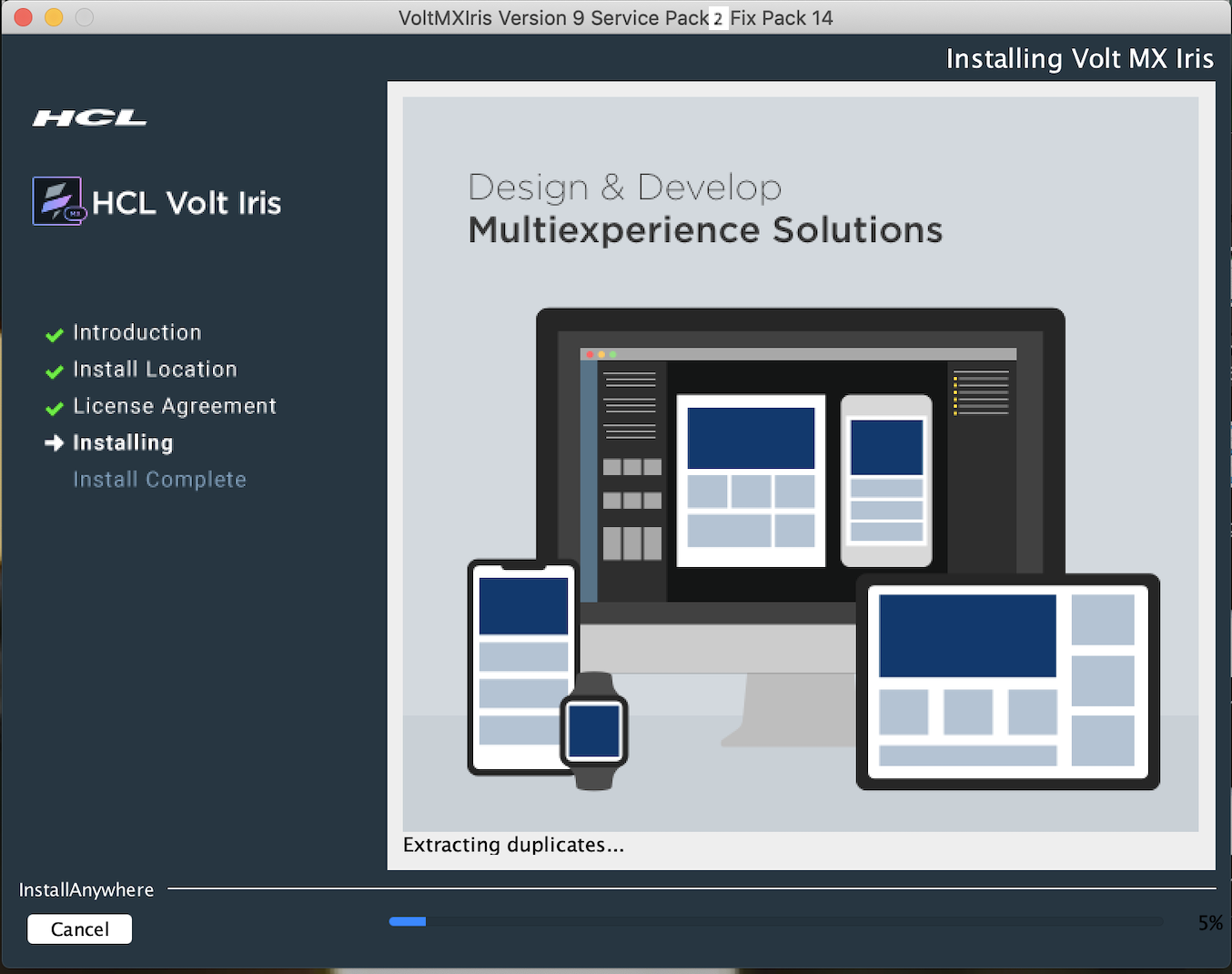Install Volt MX Iris
To install Volt MX Iris, follow these steps:
- Navigate to the location where you downloaded the installer file VoltMX-Iris-9.0.exe, and double-click it.

-
The installer extracts the required files.
After the extraction is complete, the Volt MX Iris installation window appears.
Note: Although, Volt MX Iris is a safe product to install, your anti virus or firewall may flag the product. Ensure that you give permission for installing Iris. Also, to avoid getting such warning messages in future (while updating Iris) add iris.exe to your antivirus or firewall safe list.
-
Click Next.
The Select Installation Folder pane appears.
-
Click Choose to select a folder on the drive where you want to install Volt MX Iris.
Click Restore Default Folder to reset the default installation folder. -
Click Next.
The Select Workspace Folder pane appears. -
Click Choose to select a folder on the drive to be used as Iris workspace.
Click Restore Default Folder to reset the default Iris workspace.Note: The Workspace folder contains all your Iris projects.
-
Click Next. The License Agreement pane appears.
-
Read the License Agreement carefully and if you accept the terms of the agreement, select I Accept the terms of the License Agreement option, and then click Install.
The Installing Volt MX Iris page appears, and the installation begins. -
After the installation is complete, the Install Complete pane appears.
The pane provides a QR code to download the Volt MX App application. Scan the QR code to download the app.
Note: The QR code is developed using a third party library, QRCode.js (version 0.0.1 & license). This is not bundled with the app. This library is bundled with Volt MX Iris Installer.
You can choose to select Launch Iris and click Done. Volt MX Iris sends anonymous usage data to the Volt MX Cloud. The intent is to use this data to help better understand how the application is being used. To turn off anonymous usage data collection in Iris, deselect the necessary check box under Edit > Preferences > General.
Configuring Iris to Use a Proxy Server
Note: If your computer is not configured behind a proxy server, you can skip this section and move to the next section: Launching Iris.
When your system is a part of an internal network and connects to the Internet using a proxy server, you must modify the Iris configuration settings to bypass the proxy server and access the Internet.
You can use any of the following methods to configure Iris to use a proxy server:
- Basic Proxy: Provides steps to configure your basic proxy settings to allow Iris access to the Internet.
- NTLM Proxy: Provides steps to configure your NTLM proxy settings to allow Iris access to the Internet.
- Custom NTLM Proxy: Provides steps to customize and configure your NTLM proxy settings to allow Iris access to the Internet.
Basic Proxy
To configure Iris to use a Basic proxy, follow these steps:
- In Volt MX Iris, click Edit > Preferences.
The Iris Preferences window appears.

- Click the Proxy tab.
- Under the Proxy Settings section, select the Enable Proxy check box.

-
From the Proxy Type list, select the type of the Proxy Service that you want to configure, either Basic or NTLM.
Note: You can only configure a BASIC Proxy.
-
In the Proxy Host text box, enter the value of the proxyHost.
- In the Proxy Port text box, enter the value of the proxyPort.
- In the Proxy Username text box, enter the username to sign in to the Proxy Server.
- In the Proxy Password text box, enter the password to sign in to the Proxy Server.
- In the No Proxy Hostnames text box, enter the URL of the domain that must bypass the Proxy server. You can also provide a list of URLs separated by commas.
- After you provide all the inputs, click Validate to verify the connection.
Once all the details are validated, the Done button is enabled. - Click Done.
NTLM Proxy
To configure Iris to use an NTLM proxy, follow these steps:
- Navigate to the Iris installation folder > Config folder (ex.C:\Program Files\Iris\config).
- Open the proxy_config.js file.
- Edit the following details between the USER EDITABLE SECTION START and USER EDITABLE SECTION END.
//USER EDITABLE SECTION START /* In case of NTLM custom config only PROXY_TYPE and CNTLM_PORT ProxyConfig paramaters are required. Rest can be left undefined. Custom CNTLM config can also be generated by using cntlmconf.sh on mac e.g. ./cntlmconf.sh -u NTLMUSER -d DOMAIN -s PROXY-IP:PROXY-PORT \*/ //To enable proxy, change the following value to true. var ENABLE_PROXY = false; //Type Proxy IP address. var PROXY_IP = 'XXX.XXX.XXX.XXX'; //Type NTLM Domain name. var NTLM_DOMAIN = 'XXXXXXX.com'; //Type NTLM server port number. var PROXY_PORT = 8080; //Type your Username. Note: If your user name is user@domain.com, then enter the username as useronly. Domain name is not required. var PROXY_USER = 'XXXXXX'; //Type your password. var PROXY_PWD = 'XXXXXX'; var PROXY_TYPE = PTYPE.NTLM_PROXY; //USER EDITABLE SECTION END - Save the proxy_config.js file.
Custom NTLM Proxy
To configure Iris to use a custom NTLM proxy, follow these steps:
- Navigate to the Iris installation folder > Config folder (ex. C:\Program Files\Iris\config).
- Open the proxy_config.js file.
- Edit the following details between the USER EDITABLE SECTION START and USER EDITABLE SECTION END.
//USER EDITABLE SECTION START /* In case of NTLM custom config only PROXY_TYPE and CNTLM_PORT ProxyConfig paramaters are required. Rest can be left undefined. Custom CNTLM config can also be generated by using cntlmconf.sh on mac e.g. ./cntlmconf.sh -u NTLMUSER -d DOMAIN -s PROXY-IP:PROXY-PORT \*/ //To enable proxy, change the following value to true. var ENABLE_PROXY = false; //Type Proxy IP address. var PROXY_IP = 'XXX.XXX.XXX.XXX'; //Type NTLM Domain name. var NTLM_DOMAIN = 'XXXXXXX.com'; //Type NTLM server port number. var PROXY_PORT = 8080; //Type your Username. Note: If your user name is user@domain.com, then enter the username as useronly. Domain name is not required. var PROXY_USER = 'XXXXXX'; //Type your password. var PROXY_PWD = 'XXXXXX'; //If the type of proxy used is basic, replace NTLM_PROXY with BASIC_PROXY. var PROXY_TYPE = PTYPE.NTLM_PROXY; //Change the value to false var GENERATE_NTLM_CONF = false; //USER EDITABLE SECTION END - Save and close the proxy_config.js file.
- Navigate to the Iris installation folder > nw folder> nw-win folder (ex. C:\Program Files\VoltMXIris\nw\nw_win).
Note: For some NTLM v1 and v2 configurations, the default generated cntlm.ini file may not work. In such cases, you need to customize your proxy settings.
- Open the cntlm.ini file.
- Modify the following parameters:
//Type user name Username my_proxy_user; //Type Domain name Domain my_proxy_domain.com; //Type the Proxy address:portnumber Proxy my_proxy_server:8080; - Save and close the cntlm.ini file.
- To generate the profile, follow these steps:
- Open a Command Prompt window in the current folder.
- Execute cntlm.exe -c cntlm.ini -I -M http://xxxx.com.
- Type your NTLM password, if requested, to generate a profile.
- Copy the generated profile.
- Reopen the cntlm.ini file.
- Append the profile details (copied from step 9). A portion of the cntlm.ini file after appending the parameters is shown:
Username my_proxy_user Domain my_proxy_domain.com Proxy my_proxy_server:8080 NoProxy localhost, 127.0.0.*, 10.*, 192.168.* Gateway no Listen 3128 Auth NTLMv2 PassNTLMv2 XXXXXXXXXXXXXXXXXXXXXXXXXXXXXXXX - Save the cntlm.ini file.
- Move the cntlm.ini file to User Profile folder\user name\Iris\irisdata (for example, C:\Users\Iris\irisdata).
White-list Essential Domains
Ensure that you contact your system administrator and white-list the following domain URLs:
- https://api.hclvoltmx.com
- https://manage.hclvoltmx.com
- https://manage.demo-hclvoltmx.com
- https://visualization.hclvoltmx.com
- https://accounts.auth.hclvoltmx.com
- https://download.hclvoltmx.com
- https://community.hclvoltmx.com
- https://cloud-metrics.hclvoltmx.net
- https://opensource.hcltechsw.com
- https://hcl-tech-software.github.io
- https://hclvoltmx-prototypetransit.s3.amazonaws.com




